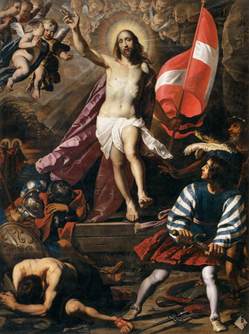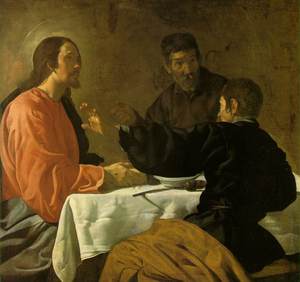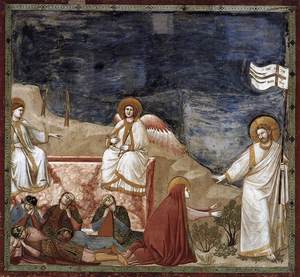
Easter, Ascension & Pentecost: April 2012 Archives


Last week, during his Easter vigil homily, Pope Benedict XVI said: ...the Church presents the mystery of light using a unique and very humble symbol: the Paschal candle. This is a light that lives from sacrifice. The candle shines inasmuch as it is burnt up. It gives light, inasmuch as it gives itself. Thus the Church presents most beautifully the paschal mystery of Christ, who gives himself and so bestows the great light. Secondly, we should remember that the light of the candle is a fire. Fire is the power that shapes the world, the force of transformation. And fire gives warmth. Here too the mystery of Christ is made newly visible. Christ, the light, is fire, flame, burning up evil and so reshaping both the world and ourselves." St. Catherine of Siena once said: "If you are what you should be, you will set the whole world on fire." Bishop Roman's last hours were spent in the same way he spent his entire life: evangelizing, preaching the gospel. He was what he should have been: a friend of the poor, the sick, the imprisoned, the exile and the immigrant. He was a friend to us all - because he was first of all and above all a friend of Jesus. He was light; he was fire. His passion for evangelization, for catechesis, was never about making people follow him but rather it was about leading them to Jesus.
Archbishop Thomas Wenski
from the Funeral homily for Bishop Agustín Román
April 14, 2012

Today Eucharist means the Risen Lord is constantly present, Christ who continues to give Himself to us, calling us to participate in the Banquet of His Body and Blood. From the full communion with Him comes every other element of the life of the Church, in the first place the communion among the Faithful, the commitment to proclaim and give witness to the Gospel, the ardor of charity towards all, especially toward the poor and the smallest.
Pope Benedict XVI
The Pope hits on something significant in the life of the Christian: keeping in front of oneself that God has not abandoned humanity AND that He thirsts for us, He desires to be in relationship with us. In our daily living the baptized seek the face of God (as it is spoken of in the Scriptures) and to recognize Christ in the faces of the people around us and in creation.
This week we've heard some beautiful readings of the resurrected Lord thus giving perspective on His previous preaching about the Cross. The resurrection makes things clearer, hopeful. The resurrected Christ laughs in the face of death. Now, He is present to us not merely in one location but now in all places and constantly through the Eucharist. The Incarnation is now a recognizable Divine Fact that walking and talking could not manage. By action of the Holy Spirit Christ is present to all who call on his Name. And we ought to give witness to this fact.
Addressing all Christians through the mouth of Saint Paul, the Spirit cries out: "If you have risen with Christ, seek the things that are above, where Christ is seated at the right hand of God" (Colossians 3:1).

For all its brevity, that sentence contains the most amazing assertion. In effect, it signifies not only that Christ has risen and that we ourselves shall one day rise with him, but that we have already risen with Christ through our baptism. The whole mystery of what it is to be a Christian subsists in that statement. Apparently, our human condition remains unchanged; yet Christ's resurrection has already accomplished its transforming work in the hidden world of our souls. Christians are now only waiting for the outward manifestation of what has already been achieved in Christ. Saint Paul, in fact, goes on to say: "Your life is hidden with Christ in God. When Christ who is your life is revealed, then you too will be revealed with him in glory" (Colossians 3:3-4).
The resurrection, therefore, means that here and now our humanity is elevated to the inaccessible realm of the divine. The resurrection is the Good News par excellence, the glorious destiny, far above its own nature, to which the Father's love has called the human race in his only Son through the gift of the Spirit.
All this only possible through the action of God. In Christ, God comes down to us, takes our carnal nature, and raises it above itself in order to carry it into the intimate presence of the Father, where Christ is seated at the right hand of God.
Thus the resurrection of Christ constitutes the first-fruits of our own resurrection. With Christ, part of our humanity is already taken up into the abyss of the Godhead. According to the metaphor employed by the writer to the Hebrews, Christ is like an anchor, which instead of being let down in the depths of the sea, is cast up into the heights of heaven (cf. Hebrews 6:19). He is the guarantee of our hope, because that hope has already been fulfilled in him.
Jean Cardinal Danielou, S.J. (1905-1974)

